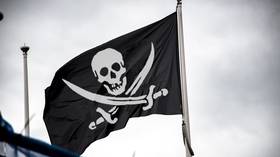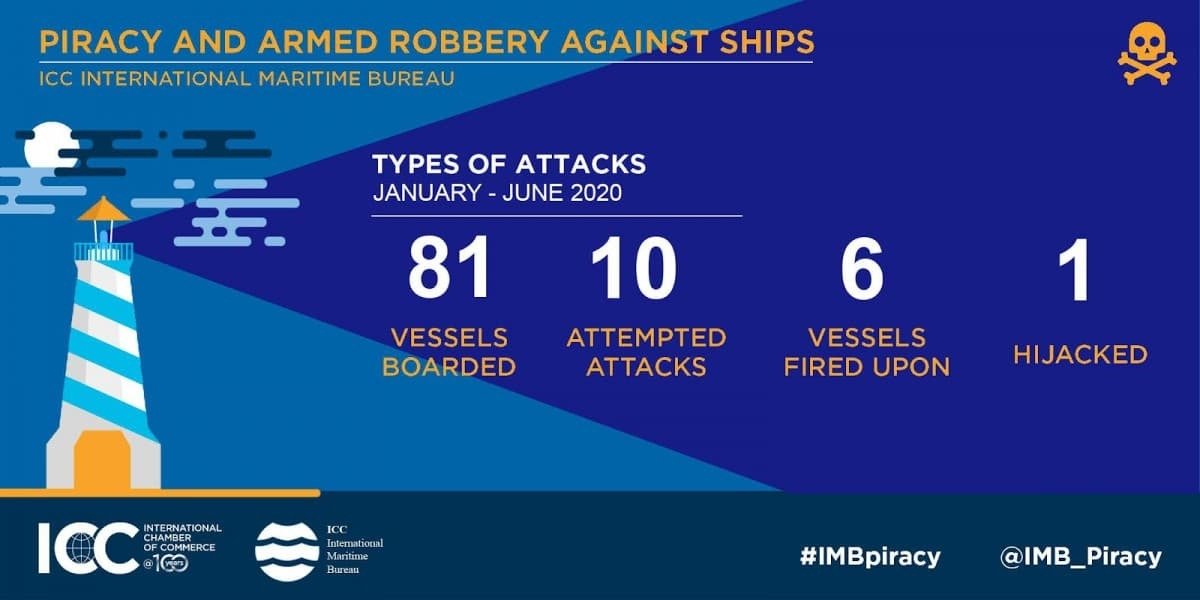Cash in on chaos: Oil piracy has SPIKED during COVID pandemic

The Covid-19 pandemic and floating oil storage boom are threatening to reverse the trend of declining attacks as pirates are looking to cash in on the chaos.
The year 2019 marked a crucial milestone in the fight against global maritime piracy. According to the International Maritime Bureau (IMB), global pirate attacks plunged to a 25-year low, with piracy on large ships of over 100GT (gross tonnage) plunging to just 41, or more than a 50 percent decline on the rolling 10-year average of 95. Notably, zero cases were recorded in the notorious Gulf of Aden off the Somali coast, once considered the deadliest piracy hotspot anywhere on the planet.
But now, the Covid-19 pandemic and floating oil storage boom are threatening to reverse that trend.
According to the Regional Cooperation Agreement on Combating Piracy and Armed Robbery (ReCAAP), attacks have returned to the Gulf of Mexico, a key floating storage hub where oil producers have been anchoring their excess inventories during the oil supply glut. Alarmingly, maritime security officials have also reported that piracy in Asia doubled during the first half of 2020 compared to last year's corresponding period.
Piracy tends to record significant upswings during times of economic downturns, and the economic devastation wrought by the Covid-19 pandemic is largely to blame for the resurgence in this global menace.
Change in Tact

Pirate attacks in the southern Gulf of Mexico surged during the month of April, which, incidentally, was the time when global floating storage filled to the brim leading to the historic oil price crash. The attacks here have primarily been focusing on ships carrying oil cargoes, with pirates preferring to rob the crews of money and seizing valuable technical equipment for sale in black markets instead of hijacking the ships. The attacks have persisted during the summer prompting the US government to issue a security alert.
On the other side of the globe, the Gulf of Guinea off the West African coast is proving to be the world's biggest piracy hotspot. What makes piracy off the West African Coast particularly egregious, is mainly due to lack of sufficient equipment and manpower as well as the fact that pirates frequently stage attacks far off coastlines beyond countries' territorial jurisdictions. The Gulf of Guinea is also well endowed with vast oil and gas riches as well as a relatively well-trained militia that has honed its skills fighting in the Delta's secessionist movement. Gulf of Guinea pirates are not only some of the most violent but have also been employing a different tactic: Hunting for human capital instead of hijacking ships. A month ago, IMB reported that 77 seafarers had been taken hostage or kidnapped for ransom in the Gulf of Guinea since January, good for more than 90 percent of all the kidnappings at sea worldwide while ship hijackings fell to the lowest level since 1993. For instance, in April, pirates attacked a floating production storage and offloading (FPSO) vessel with a capacity of 50,000 barrels per day off the coast of Nigeria and kidnapped nine crew members, leaving the oil cargo intact.
Also on rt.com Why pirates are giving up on oilWith oil prices so low, pirates in the Western Hemisphere and Africa have been giving up on oil and instead prefer hunting for other treasures onboard as well as taking human captives and demanding ransom.
Oil majors such as ExxonMobil, Chevron, ENI, Shell, and Total with operations out of Equatorial Guinea, Nigeria, and Gabon remain at high risk of experiencing piracy-related disruptions in their West African supply chains.
Asia is also emerging as another piracy hotspot. IMB says the attacks are spread across a wide swath, from the South China Sea to the coasts of Indonesia, Vietnam, India, Philippines, and Bangladesh. Most attacks, though, are concentrated in the Singapore and the Malacca straits, thanks to the unique topography of the sea. Cargo ships traveling along the Singapore Strait remain especially vulnerable, considering the water body is only 10 miles wide and features numerous tiny islands with low or non-existent human settlements and zero government presence, thus making them perfect hideouts for pirates.
Bright outlook
Despite the pandemic-fueled resurgence in global piracy, the long-term outlook remains bright. Our experiences with the Gulf of Aden and other former piracy hotspots proves that by using the right tactics, piracy can be stamped out or, at least, minimized.
READ MORE: Somali pirates strike for first time in 5 years with freighter hijacking
For instance, taking a radical break with traditional shipping practices by deploying armed guards on commercial vessels has largely been credited with defeating piracy in Somalia.
Further, improved surveillance from the air and sea through collaborative initiatives such as the "Eyes in the Sky" agreement between Malaysia, Indonesia, Thailand, and Singapore has been successful, too.
This article was originally published on Oilprice.com














